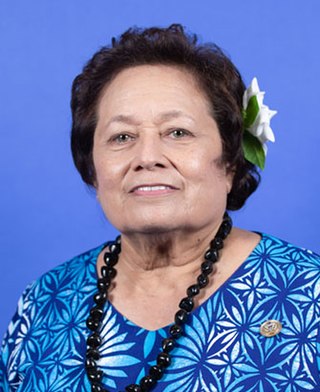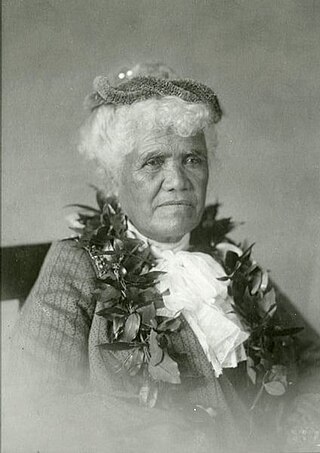
Saipan is the largest island of the Northern Mariana Islands, a commonwealth of the United States in the western Pacific Ocean. According to 2020 estimates by the United States Census Bureau, the population of Saipan was 43,385, a decline of 10% from its 2010 count of 48,220.
Mitsuye Yamada is a Japanese American poet, essayist, and feminist and human rights activist. She was one of the first and most vocal Asian American women writers to write about the wartime incarceration of Japanese Americans.
The Association for Asian American Studies was founded in 1979 as the Association for Asian/Pacific American Studies. The name was changed in 1982. The organization was established to promote teaching and research in Asian American studies. Its other goals including advocacy and representation on behalf of Asian-Americans and educating American society about the history and aspirations of Asian American ethnic minorities.
Asian people are the people of Asia. The term may also refer to their descendants.
Chinese American literature is the body of literature produced in the United States by writers of Chinese descent. The genre began in the 19th century and flowered in the 20th with such authors as Sui Sin Far, Frank Chin, Maxine Hong Kingston, and Amy Tan.
Asian Americans, who are Americans of Asian descent, have fought and served on behalf of the United States since the American Revolutionary War. During the American Civil War Asian Americans fought for both the Union and the Confederacy. Afterwards Asian Americans served primarily in the U.S. Navy until the Philippine–American War.
Ji-Yeon Yuh is an American reporter, writer, editor and professor in Asian American history and Asian diasporas at the Northwestern University. Since 2005, Yuh is the director of Program in Asian American Studies at Northwestern University.
Maggie Gee was an American aviator who served in the Women Airforce Service Pilots (WASP) in World War II. She was one of two Chinese-American women to serve in the organization, the other being Hazel Ying Lee. As a WASP pilot, she helped male pilots train for combat, as female pilots were not allowed to serve in combat at that time. She also ferried military aircraft.

Asian/Pacific American (APA) or Asian/Pacific Islander (API) or Asian American and Pacific Islanders (AAPI) or Asian American and Native Hawaiians/Pacific Islander (AANHPI) is a term sometimes used in the United States when including both Asian and Pacific Islander Americans.
The Asian American and Pacific Islander Policy Research Consortium (AAPIPRC) focuses on critical policy issues facing the Asian American and Pacific Islander communities. Conceived of as part of the White House Executive Order 13515 (2009) the consortium supports, promotes, and conducts applied social science and policy research. In addition, Professor Paul M. Ong proposed two courses of action for AAPIPRC, one which formalizes working relationships among university-based AAPI research institutions and the other which would include publishing the proceedings of the briefs to inform policy.
This is a timeline of notable events in the history of non-heterosexual conforming people of Asian and Pacific Islander ancestry, who may identify as LGBTIQGNC, men who have sex with men, or related culturally-specific identities. This timeline includes events both in Asia and the Pacific Islands and in the global Asian and Pacific Islander diaspora, as the histories are very deeply linked. Please note: this is a very incomplete timeline, notably lacking LGBTQ-specific items from the 1800s to 1970s, and should not be used as a research resource until additional material is added.

Amata Catherine Coleman Radewagen, commonly called Aumua Amata, is an American Samoan politician who is the current delegate for the United States House of Representatives from American Samoa. Radewagen, a Republican, was elected on November 4, 2014, after defeating Democratic incumbent Eni Faleomavaega; she was the first ever Republican delegate since the office had been created in 1970 and began her tenure on January 3, 2015. She also serves as the national committee woman for the Republican Party of American Samoa. Amata is the first woman to represent American Samoa in the U.S. Congress.

Ke AliʻiKamaka Oukamakaokawaukeoiopiopio Stillman (1833–1924) was an aliʻi of the Kingdom of Hawaii as well a prominent figure after its overthrow through equestrianism as a Paʻu rider in the Kamehameha Day celebrations as well as an acknowledged authority on Hawaiian genealogy and oral chants. She is descended from Kahaopuolani, the aliʻi wahine who had hidden Kamehameha I as a baby and raised him for years in Kohala, Hawaiʻi along with his brother and her own children. Stillman published a response to a 1911, Hawaiian Newspaper account of the birth of Kamehameha the Great, correcting information from the oral traditions handed down within the Kahala family.
GAPIMNY is an all-volunteer-run organization that provides a range of social, educational, and cultural programming for queer and transgender people who are Asian and/or Pacific Islander in the New York City metropolitan area to support each other. The organization's community building efforts is intricately tied to political education and mutual aid.
Ha Soo Whang (1892-1984), also known as Hwang Hae-su, was a social worker. She was the first Korean social worker in Hawaii, and acted as a bilingual interpreter for the families under her care. A graduate of Athens College, she was affiliated with the YWCA's International Institute. She is credited with spreading the art of Korean dance in Hawaii.
"Auntie" Irmgard Keali'iwahinealohanohokahaopuamanaFarden Aluli was a Hawaiian composer who wrote over 200 songs. In Hawaii, she was considered a haku mele, or maker of songs. Aluli is considered the most prolific woman composer of Hawaii since Queen Lili'uokalani. She is the fourth person to be honored twice for a Lifetime Achievement Award by the Hawai'i Academy of Recording Arts (HARA). She has also been inducted into the Hawaiian Music Hall of Fame.
Hui Aloha ʻĀina were two Hawaiian nationalist organizations established by Native Hawaiian political leaders and statesmen and their spouses in the aftermath of the overthrow of the Hawaiian Kingdom and Queen Liliʻuokalani on January 17, 1893. The organization was formed to promote Hawaiian patriotism and independence and oppose the overthrow and the annexation of Hawaii to the United States. Its members organized and collected the Kūʻē Petitions to oppose the annexation, which ultimately blocked a treaty of annexation in the United States Senate in 1897.

Kala Bagai was a South Asian American immigrant and community activist. The Smithsonian described her as "a life-long advocate for immigrants and a mother figure among South Asian communities in California."
Momoko Iko (1940–2020) was a Japanese-American playwright, best known for her 1972 play Gold Watch. She was also a founding member of the Asian Liberation Organization and the Pacific Asian American Women Writers West.
Haunani Kahalewai was a singer and entertainer known as the "First Lady of Song in Hawai‘i". Her distinctive contralto voice spanned three octaves. She was featured on dozens of recordings and headlined the Polynesian Review at the Royal Hawaiian Hotel in Waikiki. Kahalewai was inducted into the Hawaiian Music Hall of Fame in 1996.




